Mostrar el registro sencillo del ítem
dc.contributor.author
Núñez, Karina
dc.contributor.author
Duré Pitteri, Marta Inés

dc.contributor.author
Zárate, Griselda
dc.contributor.author
Ortiz, Fátima
dc.contributor.author
Mendoza, Medes
dc.date.available
2023-01-04T18:25:34Z
dc.date.issued
2021-08
dc.identifier.citation
Núñez, Karina; Duré Pitteri, Marta Inés; Zárate, Griselda; Ortiz, Fátima; Mendoza, Medes; Diet of Melanophryniscus paraguayensis (Anura: Bufonidae): An Endemic Species to Paraguay; Herpetological Conservation and Biology; Herpetological Conservation and Biology; 16; 2; 8-2021; 251-258
dc.identifier.issn
1931-7603
dc.identifier.uri
http://hdl.handle.net/11336/183394
dc.description.abstract
Melanophryniscus paraguayensis (no common name) is an endemic toad of the central grasslands in the eastern region of Paraguay. Details about its natural history are poorly understood and it is categorized nationally as Vulnerable. This work describes the diet composition of this species and the relationship between toad body size and the number and volume of prey consumed. We analyzed the stomach content of 162 individuals, using the stomach flushing technique, after measuring and weighing them. For each prey category, we calculated the volume, number, and frequency of occurrence, and we estimated the relative importance index (IRI) with these data. We also estimated the standardized Shannon Diversity Index and Levins Niche Breadth Index for prey categories, and we analyzed the correlation between size of the anurans and prey size. Seventy-six individuals had identifiable content, which consisted of 1,357 prey classified into 16 categories, mostly at the order level. Ants and mites were the prey taxa with the greatest contribution in number and frequency and represent the most important prey based on IRI. Volumetrically, ants and beetles predominated. Ticks, spiders, springtails, flies, true bugs, wasps, termites, thrips, larvae and nymphs of insects, centipedes, crabs, and snails were occasional prey. The mean prey volume consumed by toads was positively correlated with toad snout-vent length. The Shannon and Levins indices showed that the composition of the diet was dominated by a few groups of arthropods. This work demonstrates the importance of ants, mites, and beetles as food for M. paraguayensis, which is consistent with findings for other species of the genus Melanophryniscus and of many species of the Bufonidae family.
dc.format
application/pdf
dc.language.iso
eng
dc.publisher
Herpetological Conservation and Biology
dc.rights
info:eu-repo/semantics/openAccess
dc.rights.uri
https://creativecommons.org/licenses/by-nc-sa/2.5/ar/
dc.subject
FORMICIDAE
dc.subject
PREDATOR-PREY
dc.subject
TROPHIC ECOLOGY
dc.subject
ANURA
dc.subject.classification
Ecología

dc.subject.classification
Ciencias Biológicas

dc.subject.classification
CIENCIAS NATURALES Y EXACTAS

dc.title
Diet of Melanophryniscus paraguayensis (Anura: Bufonidae): An Endemic Species to Paraguay
dc.type
info:eu-repo/semantics/article
dc.type
info:ar-repo/semantics/artículo
dc.type
info:eu-repo/semantics/publishedVersion
dc.date.updated
2022-08-19T18:16:59Z
dc.identifier.eissn
2151-0733
dc.journal.volume
16
dc.journal.number
2
dc.journal.pagination
251-258
dc.journal.pais
Estados Unidos

dc.description.fil
Fil: Núñez, Karina. Universidad Nacional de Asunción; Paraguay
dc.description.fil
Fil: Duré Pitteri, Marta Inés. Consejo Nacional de Investigaciones Científicas y Técnicas. Centro Científico Tecnológico Conicet - Nordeste. Centro de Ecología Aplicada del Litoral. Universidad Nacional del Nordeste. Centro de Ecología Aplicada del Litoral; Argentina
dc.description.fil
Fil: Zárate, Griselda. Universidad Nacional de Asunción; Paraguay
dc.description.fil
Fil: Ortiz, Fátima. Universidad Nacional de Asunción; Paraguay
dc.description.fil
Fil: Mendoza, Medes. Universidad Nacional de Asunción; Paraguay
dc.journal.title
Herpetological Conservation and Biology
dc.relation.alternativeid
info:eu-repo/semantics/altIdentifier/url/https://www.herpconbio.org/contents_vol16_issue2.html
Archivos asociados
